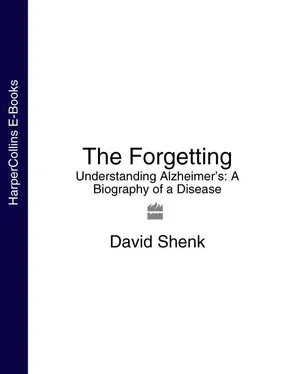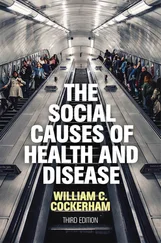What the fifty-one-year-old Auguste D.’s condition did strongly evoke was a well-known ailment among the elderly: a sharp unraveling of memory and mind that had, for more than five thousand years, been accepted by doctors and philosophers as a routine consequence of aging.
History is stacked with colorful, poignant accounts of the elderly behaving in strange ways before they die, losing connection with their memories and the world around them, making rash decisions, acting with the impetuousness and irresponsibility of children. Plato insisted that those suffering from “the influence of extreme old age” should be excused from the commission of the crimes of sacrilege, treachery, and treason. Cicero lamented the folly of “frivolous” old men. Homer, Aristotle, Maimonides, Chaucer, Thackeray, Boswell, Pope, and Swift all wrote of a distressing feebleness of mind that infected those of advancing years.
“Old age,” wrote Roger Bacon, “is the home of forgetfulness.”
Known as morosis in Greek, oblivio and dementia in Latin, dotage in Middle English, démence in French, and fatuity in eighteenth-century English, the condition was definitively termed senile dementia in 1838 by the French psychiatrist Jean Étienne Esquirol. In a depiction any doctor or caregiver would recognize today. Esquirol wrote: “Senile dementia is established slowly. It commences with enfeeblement of memory, particularly the memory of recent impressions.”
But that was senile dementia. What was this? Alois Alzheimer wanted to know. Why did a fifty-one-year-old appear to be going senile? How could Auguste D. be suffering from the influence of extreme old age?
We are the sum of our memories. Everything we know, everything we perceive, every movement we make is shaped by them. “The truth is,” Friedrich Nietzsche wrote, “that, in the process by which the human being, in thinking, reflecting, comparing, separating, and combining … inside that surrounding misty cloud a bright gleaming beam of light arises, only then, through the power of using the past for living and making history out of what has happened, does a person first become a person.”
The Austrian psychiatrist Viktor Frankl made much the same point in Man’s Search for Meaning , his memoir of experiences as a concentration camp inmate. Frankl recalled trying to lift the spirits of his fellow camp inmates on an especially awful day in Dachau: “I did not only talk of the future and the veil which was drawn over it. I also mentioned the past; all its joys, and how its light shone even in the present darkness. [I quoted] a poet … who had written. Was Du erlebst, kann keine Macht der Welt Dir rauben . (What you have experienced, no power on earth can take from you.) Not only our experiences, but all we have done, whatever great thoughts we may have had and all we have suffered, all this is not lost, though it is past; we have brought it into being. Having been is a kind of being, and perhaps the surest kind.”
Emerson was also fascinated by memory—how it worked, why it failed, the ways it shaped human consciousness. Memory, he offered about a decade or so before his own troubles first appeared, is “the cement, the bitumen, the matrix in which the other faculties are embedded … without it all life and thought were an unrelated succession.” While he constructed an elaborate external memory system in topical notebooks, filling thousands of pages of facts and observations that were intricately cross-referenced and indexed, Emerson was also known for his own keen internal memory. He could recite by heart all of Milton’s “Lycidas” and much of Wordsworth, and made it a regular practice to recite poetry to his children on their walks. His journal entries depict an enchantment with the memory feats of others.
He kept a list:
• Frederic the Great knew every bottle in his cellar.
• Magliabecchi wrote off his book from memory.
• Seneca could say 2,000 words in one hearing.
• L. Scipio knew the name of every man in Rome.
• Judge Parsons knew all his dockets next year.
• Themistocles knew the names of all the Athenians.
“We estimate a man by how much he remembers,” Emerson wrote.
Ronald Reagan was never particularly admired for his memory. But in the late 1980s and early ’90s, he slowly began to lose his grasp on ordinary function. In 1992, three years after leaving the White House, Reagan’s forgetting became impossible to ignore. He was eighty-one.
Both his mother and older brother had experienced senility, and he had demonstrated a mild forgetfulness in the late years of his presidency. Like many people who eventually suffer from the disease, Reagan may have had an inkling for some time of what was to come. In his stable of disarming jokes were several about memory troubles afflicting the elderly. He shared one at a 1985 dinner honoring Senator Russell Long.
An elderly couple was getting ready for bed one night, Reagan told the crowd. The wife turned to her husband and said, “I’m just so hungry for ice cream and there isn’t any in the house.”
“I’ll get you some,” her husband offered.
“You’re a dear,” she said. “Vanilla with chocolate sauce. Write it down—you’ll forget.”
“I won’t forget,” he said.
“With whipped cream on top.”
“Vanilla with chocolate sauce and whipped cream on top,” he repeated.
“And a cherry,” she said.
“And a cherry on top.”
“Please write it down,” she said. “I know you’ll forget.”
“I won’t forget,” he insisted. “Vanilla with chocolate sauce, whipped cream, and a cherry on top.”
The husband went off and returned after a while with a paper bag, which he handed to his wife in bed. She opened up the bag, and pulled out a ham sandwich.
“I told you to write it down,” she said. “You forgot the mustard.”
It seems clear enough that Reagan was increasingly bothered by personal memory lapses. In a regular White House checkup late in his second term, the President began by joking to his doctor, “I have three things that I want to tell you today. The first is that I seem to be having a little problem with my memory. I cannot remember the other two.”
Did Reagan have Alzheimer’s disease in office? Yes and no. Without a doubt, he was on his way to getting the disease, which develops over many years. But it is equally clear that there was not yet nearly enough decline in function to support even a tentative diagnosis. Reagan’s mind was well within the realm of normal functioning. Even if his doctors had been looking intently for Alzheimer’s, it is still likely that they would not have been able to detect the disease-in-progress. A slight deterioration of memory is so common among the elderly that even today it is considered to be a natural (if unwelcome) consequence of aging. About a third to a half of all human beings experience some mild decline in memory as they get older, taking longer to learn directions, for example, or having some difficulty recalling names or numbers.
Alzheimer’s disease overtakes a person very gradually, and for a while can be indistinguishable from such mild memory loss. But eventually the forgetting reaches the stage where it is quite distinct from an absentminded loss of one’s glasses or keys. Fleeting moments of almost total confusion seize a person who is otherwise entirely healthy and lucid. Suddenly, on a routine drive home from work, an intersection he has seen a thousand times is now totally unfamiliar. Or he is asking about when his son is coming back from his vacation, and his wife says: “What do you mean? We both spoke to him last night.” Or he is paying the check after a perfectly pleasant night out and it’s the strangest thing, but he just cannot calculate the 20 percent tip.
Читать дальше












